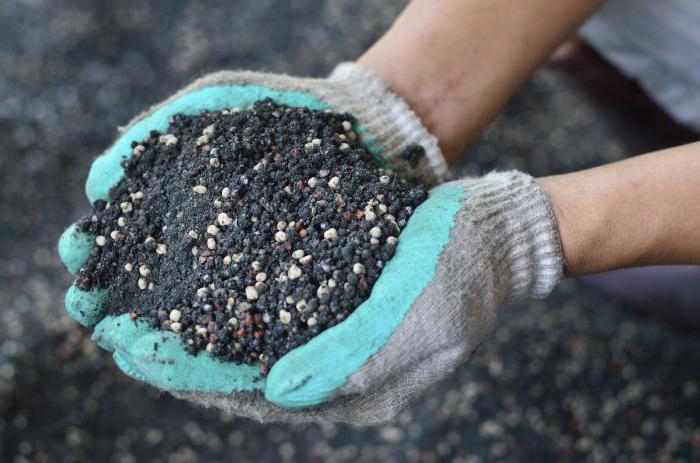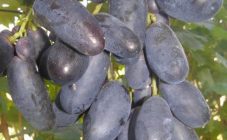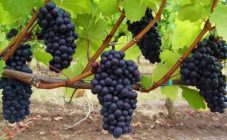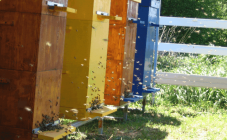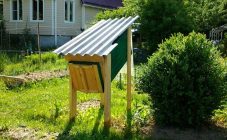Grapevine in the Altai Republic originated in the middle of the 20th century. The cultivation of grapes was hampered by winter for a period of six months, insufficient growing season, constant temperature fluctuations. Therefore, landing such a luxury will take a lot of effort. And for this it is necessary to observe many agrotechnical and natural conditions.
Altai grape varieties
Due to the low temperatures in the vineyard, reaching below -40 degrees, gardeners need to choose frost-resistant grape varieties. Therefore, the best options are early, super-early varieties. Their main feature is that their growing season lasts 120 days - early varieties. And the ultra-early ripening is enough for about 100 days. Altai grapes ripen from August to September.
- Tukay. Weight - 1 kg, berry weight 4-5 g, glucose-18%, vegetation period up to 100 days. The average yield can exceed 16 kg. This grape variety is considered to be early maturing. After the end of full ripening, the grapes can still hang unharvested for a rather long time. And this will not affect its taste and appearance in any way. The fruit is protected by a thick layer of skin that provides protection at low temperatures.
- Muromets. The duration of the growing season is 105 days, the mass of the brush is from 300 to 500 g, the weight of the fruit is 5 g, sugar is 18%, the amount of harvest is about 16 kg.
This type also belongs to the early varieties. If you follow the correct care of the plant, then the ripening period is reduced to 95 days. Usually by the end of August, the berries are already ripe. Ripe Murom berry has a purple hue. This species is resistant to frost, withstands temperatures of -27 degrees. - Rusven. Ripens in 115-120 days. The mass of the hand is more than 800 g, the weight of the fruit is 6 g, the sugar level is 20%. The crop weight reaches 16-17 kg.
This variety is well suited for making wine, juice, oil, known for its beneficial properties. Frost resistance up to -27 degrees. Rusven bushes have large clusters. The fruits are pink in color and have a sweet taste, which is very attractive to insects. - Red nutmeg. Ripens in 95 days. The mass of the hand is 400-500 g, the weight of the fetus is 5 g. Glucose can exceed 28%. The average yield is 30 kg.
And this variety is classified as a super-early species. Red nutmeg grows in small shrubs, clusters of medium size, reaching, with proper care, a mass of 500 g. But the berries themselves are large. The color of the berries is dark burgundy.
There are other grape varieties in the Altai Territory. For example, Altai grapes are white, which is a mixture of Tukai and Malengra.
Sowing rules
It is not easy to get grapes in Altai; it will be a big and difficult challenge for novice gardeners. It is worth adhering to the basic rules of agricultural technology.
Grapes are planted in Altai in early April or May. Frost-resistant varieties should also be planted in October. And for them, a special spruce branch is made for insulation.
How is spruce branch made? First, a trench 6-7 m long is dug, and the walls are reinforced with boards. Pits for digging in cuttings should have a depth of at least 50 cm. Superphosphate or ash is well suited for fertilizing the soil.
After the temperature has risen to +12 degrees, it will be possible to plant seedlings.
Diseases of grapes
The grapes are resistant to disease. But still not enough. The plant is threatened by a fungus. As a result of fungal damage, diseases develop:
- Alternaria.
- Mildew.
- Odium.
The listed diseases are manifested by a grayish bloom on young leaves or mold on the shoots. The danger is that the disease can spread to the fetus.
The main stages of care
- Pruning. The first stage is after the ripe fruits are harvested. The second stage is at the end of autumn.
- If the weather is rainy, then watering is carried out no more than twice a week.
- Before the onset of winter, the bushes are covered with cloth or polyethylene.
The main stages of care are proper pruning and shelter for the winter. They allow you to save the vine and correctly direct its forces - to ripen the fruit, and not to form the crown.

